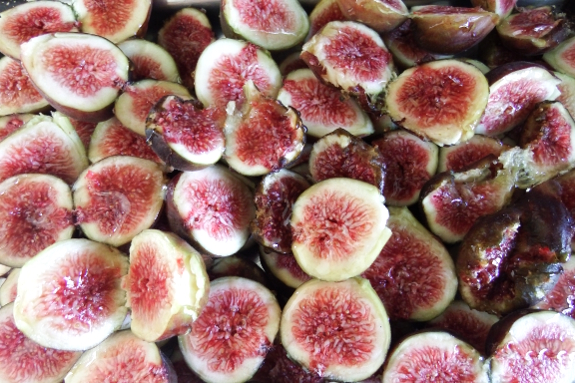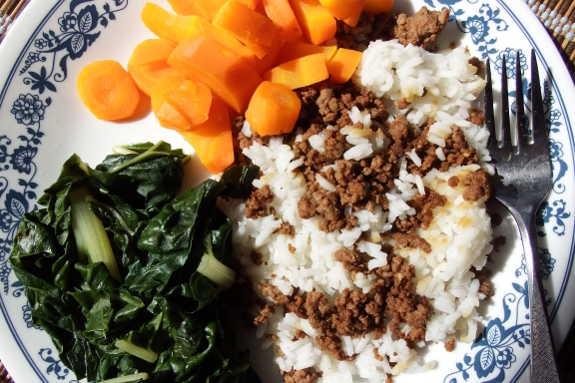
Science-fair tummy, part 2

I thought I was on the
mend with my hummingbird
diet...and then I started trying to add a few foods back in and it
all went to pot. This is the trouble with uncontrolled
experiments where you change more than one variable at a time.
Luckily, you can always come up with a new hypothesis and try again.

So I pored over the
internet some more and came up with another alternative ---
carbohydrates known as FODMAPs could be irritating my gut. I was leery
at first of adding back in delicious ingredients that I'd assumed had
far too much fat or fiber for my bowels to handle. But I was thrilled
to learn that aged cheeses, oranges, clementines, lettuce, leafy
greens, and carrots have all been well received down there as long as I
cook the last two into submission to increase digestability. I almost
feel like I'm eating real food again!
The plan this time
around is to do two weeks of a severely restricted FODMAP diet, then
begin trialing the five categories one per week. In case you'd like to
start a betting pool, I'm guessing I don't have issues with lactose or
galactans but do with fructose and, to a lesser extent, polyols and
fructans. Don't you love home science experiments?
Want more in-depth information? Browse through our books.
Or explore more posts by date or by subject.
About us: Anna Hess and Mark Hamilton spent over a decade living self-sufficiently in the mountains of Virginia before moving north to start over from scratch in the foothills of Ohio. They've experimented with permaculture, no-till gardening, trailersteading, home-based microbusinesses and much more, writing about their adventures in both blogs and books.
Want to be notified when new comments are posted on this page? Click on the RSS button after you add a comment to subscribe to the comment feed, or simply check the box beside "email replies to me" while writing your comment.

Do you filter your water or have you tested your water?
Recurrent gastro-intestinal illness = Coliform bacteria
Mom --- You can see the foods broken down by category on the second page here.
Dan --- That could possibly have been implicated at the beginning, but water definitely isn't the issue now since Mark put me on store-bought water a couple of months ago just to be safe. And, to be fair, my illness isn't recurrent --- it's just slow to heal and never stopped.... But I appreciate your input!
@adrienne: Alcohols are are substances that consist mainly of carbon (C) and hydrogen (H) atoms but contain one or more oxygen/hydrogen groups (OH). Ethanol (C₂H₅OH) is an alcohol with a single OH group. Alcohols with more than one OH group are called polyols. Galactans are polymers of galactose (milk sugar); multiple galactose molecules linked together.
@dan: Even healthy guts are filled with coliform bacteria...
@anna: Even if you switched to bottled water (taking away a possible source of infection) that won't solve any infections you might have. And since you also handle manure and presumably goat and chicken poop, there are plenty of other infection sources around.
Roland --- I've been trying not to dive into the nitty gritty of diagnosis here because even the doctors aren't sure what I have/had and I don't think debating my symptoms with the non-medical is helpful.
That said, I have done a round of heavy duty antibiotics that may have wiped out the original problem. And I'm pretty careful with all the manure I play with so I doubt I've reseeded any bad critters.
Most likely, I did get some kind of infection (either waterborne or foodborne or possibly just a shift in gut bacteria toward the baddies and away from the goodies) in the first place. Unfortunately, it was bad enough it upset my gut enough to make it really sensitive to...well...anything.
Technically, it's not irritable bowel syndrome until I have it for six months and have also definitively disproved other possible causes like microscopic colitis with a colonoscopy and other tests. I have high hopes to lick this problem before that deadline. But, otherwise, that's the most likely current diagnosis and why the FODMAP diet is likely to help.
Reading these comments is like listening to a discussion of religion down at the corner pub
Diarrheal diseases can be basically broken down into 3 categories: (1)damaged mucosa preventing proper absorption of nutrients & water &/or causing excessive leakage of water into gut [b] osmotic-- poor absorption of certain foodstuff that draw excessive water into bowels and [3] motility disorders.
Things like IBS or enzyme deficiencies & allergies don't usually start suddenly. Most infectious diseases (but not all- eg: giardiasis or amoebiasis) are self limited, lasting only a few days. Endocrine diseases like hyperthyroidism or pancreatic tumors are often over-looked as causes. Presumably stool samples have been submitted for detection of infectious agents/parasites. A colonoscopy seems to have been done. Scoping the upper GI should also be done to detect celiac disease as well as peptic problems.
When the diagnosis is not definite, non-specific treatments are in order: start with liquid diet, adding in solids one at a time, avoiding the obviously hard to digest, like fatty meats, or high cellulose/starch foods. Immodium can be used to make life a little more convenient, hopefully to be eventually discontinued.
While Anna's rustic lifestyle makes us suspicious that some infectious/parasitic agent may be at work, it doesn't necessarily have to be.